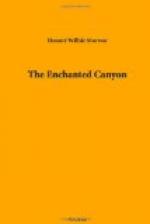Enoch looked at the freckled, ruddy face and smiled. “Thank you, Milton. You’ve given me something to think about.”
“I doubt if you lack subjects,” replied Milton drily. “But—well, I have an idea you came out here looking for something. There are lines around your eyes that say that. So I just thought I’d hand on to you what I got.”
Enoch nodded and the two smoked for a while in silence. Then Enoch said in a low voice:
“Do you have trouble with Forrester and Harden?”
“Yes, constant friction. They’re both fine fellows, but naturally antagonistic to each other.”
“A fellow may be ever so fine,” said Enoch, “yet lack the sense of team play that is absolutely essential in a job like this.”
“Exactly,” replied Milton. “The great difficulty is that you can’t judge men until they’re undergoing the trial. Then it’s too late. In Powell’s first expedition, soon after the Civil War, there was constant friction between Powell and three of his men. At last, although they had signed a contract to stick by him, they deserted him.”
“How was that?” asked Enoch with interest.
“They simply insisted on being put ashore and they climbed out of the Canyon with the idea of getting to some of the Mormon settlements. But the Indians killed them almost at once, poor devils! Powell got the story of it on his second expedition. The history of those two expeditions, I think, are as glorious as any chapter in our American annals.”
“Was it so much harder than the work you are doing?”
“There is no comparison! We’re simply following the trail that Powell blazed. Think of his superb courage! These terrible waters were enshrouded in mystery and fear. He did not know even what kind of boats could live in them. Hostile Indians marauded on either hand. And as near as I recall the only settlements he could call on, if he succeeded in clambering out of the Canyon, were Ft. Defiance in New Mexico, and Mormon settlements, miles across the desert in Utah.”
“Hum!” said Enoch slowly, “it doesn’t seem to me that things are so much better now, that we need to boast about them. There are no Indians, to be sure, but the river is about all human endurance and ingenuity can cope with, just as it was in Powell’s day.”
“She’s a bird, all right!” sighed Milton. “Well, Judge, I’m going to turn in. To-morrow’s another day! Good night.”
“Good night, Captain!” replied Enoch. He threw another stick of driftwood on the fire and after a moment’s thought fetched the black diary from his rubber dunnage bag. When the fire was clear and bright, he began to write.




